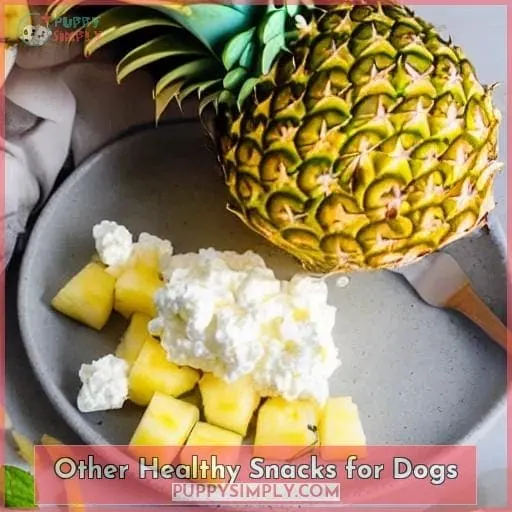This site is supported by our readers. We may earn a commission, at no cost to you, if you purchase through links.
Have you ever wondered if dogs can eat cottage cheese with pineapple?
You’re not alone! Many dog owners are curious about the health benefits and potential risks of adding cottage cheese to their pup’s diet.
Cottage cheese is a nutrient-rich snack that may offer some surprising health advantages for your canine companion, but there are also a few things to watch out for.
In this article, we’ll explore the pros and cons of feeding your pup cottage cheese along with pineapple so that you can make an informed decision about what’s best for them.
We’ll also look at other healthy snacks they might enjoy instead!
Table Of Contents
- Can Dogs Eat Cottage Cheese With Pineapple?
- How to Incorporate Cottage Cheese Into Your Dog’s Diet
- Selecting the Right Cottage Cheese for Dogs
- Feeding Cottage Cheese to Puppies and Pregnant Dogs
- Other Healthy Snacks for Dogs
- Frequently Asked Questions (FAQs)
- How much cottage cheese should I give my dog per day?
- Is cottage cheese safe for all breeds of dogs?
- Are there any potential risks associated with feeding cottage cheese to my dog?
- Can I give cottage cheese to my dog as a substitute for a meal?
- Can my dog eat cottage cheese with other fruits besides pineapple?
- Conclusion
Can Dogs Eat Cottage Cheese With Pineapple?
 You may be wondering if you can give your pup a special treat of cottage cheese with pineapple. This combination is an occasional treat that should be given in moderation due to the high fiber content of pineapple, which could cause diarrhea if too much is eaten.
You may be wondering if you can give your pup a special treat of cottage cheese with pineapple. This combination is an occasional treat that should be given in moderation due to the high fiber content of pineapple, which could cause diarrhea if too much is eaten.
It’s also important to avoid artificial sweeteners often found in cottage cheese treats as these are toxic for dogs.
Pineapple and Cottage Cheese as a Occasional Treat
Treat your pup to the occasional indulgence of pineapple and cottage cheese, a nutritious snack that will help keep their digestive system in balance! It’s important to regulate portion control when feeding this delicious treat as too much can cause weight gain or even obesity.
When introducing any new food into your dog’s diet, it’s best to start small and monitor for adverse reactions, especially if they have allergies or are lactose intolerant. Dairy products, such as low-fat cottage cheese, offer protein sources that provide beneficial nutrients like calcium, phosphorus, and selenium.
A cup of low-fat cottage cheese offers 28g of protein with 163 calories per serving, making it an excellent source for homemade treats while still maintaining nutritional balance.
By incorporating pineapple into homemade treats, you can provide additional fiber content, but be aware that too much may cause diarrhea due to its high sugar content.
With allergy awareness in mind, always consult with a vet before feeding human food items like these – they know what’s best for them after all!
Transitioning from this section about occasional treats using pineapples and cottage cheeses, let’s move onto discussing how excessive amounts of fiber could lead cats down the path towards diarrhea problems.
Pineapple High in Fiber Causing Diarrhea
Too much pineapple in your furry friend’s diet can be like a slippery slope, leading to an avalanche of diarrhea problems. The high fiber content of pineapple can cause digestive issues if not monitored carefully and balanced with low-fat cottage cheese or other fresh food sources as part of the dog’s diet.
Yogurt benefits are also beneficial for digestion due to its probiotic qualities, but make sure you check for any allergies before introducing it into their diet. Additionally, incorporating digestive enzymes may help break down proteins and fats from the cottage cheese alternatives more efficiently while reducing allergy symptoms that could result from excessive fat sources in their meal plan.
Ultimately, by keeping a close eye on how much pineapple your pup is consuming along with monitoring its reaction to cottage cheese will ensure they stay healthy and happy!
Artificial Sweeteners in Cottage Cheese Toxic to Dogs
Be careful of artificial sweeteners in cottage cheese treats for your pup, as they can be toxic for them. Alternatives to these sweeteners are natural sugar substitutes such as honey and agave syrup which can offer a healthy boost without the risk associated with artificial ingredients.
Cottage cheese offers an excellent source of protein and calcium that is beneficial to your beloved dog’s diet in small amounts – one cup of low fat contains 11g protein and 83g calcium! This nutrient-rich dairy product helps maintain a healthy immune system while providing variety for their meals.
However, pineapple high in fiber could cause diarrhea if too much is consumed at once – it’s best to introduce it gradually into their diet or use small pieces as occasional treat rather than regular addition.
Always consult with your vet before adding any human food, even ones like cottage cheese, into your pet’s daily routine – this will help ensure safe consumption that won’t upset their digestive system!
How to Incorporate Cottage Cheese Into Your Dog’s Diet

If you want to incorporate it into their regular diet, mix low-fat cottage cheese with dry food for nutrition and moisture; if adding more complex ingredients like pineapple chunks remember the 20% rule for human foods as toppings.
Use as a Special Treat or for Upset Stomach
For an occasional treat or to soothe a pet’s upset stomach, consider adding low-fat cottage cheese into their diet. Cottage cheese offers plenty of nutritional and health benefits for dogs. It has essential fatty acids and calcium content that is lower than other dairy products like milk.
It also provides a good source of probiotics, which can help aid in digestion as well as allergies associated with milk consumption.
The portion size should be monitored carefully when incorporating it into your dog’s diet. But the fresh alternative will provide more bioavailable versions of vitamins and minerals compared to synthetic options on the market today.
With its high protein content, making it satiating for weight control issues too, make sure you consult with a vet before using cottage cheese as part of home treatment plans due to its calcium content.
Mix With Dry Food for Nutrition and Moisture
You can add cottage cheese to your pet’s dry food for a nutritional and hydrating boost.
Low-fat cottage cheese is an excellent source of protein with essential amino acids. It also offers plenty of calcium, vitamin B12, and phosphorus. When adding this delicious ingredient to their diet, you should take into account taste combinations, flavor profiles, nutrient balance, and portion control.
Keep in mind that too much fat can lead to weight gain – so try opting for low-fat options when possible!
Use 20% Rule for Human Foods as Toppers
You can use low-fat cottage cheese as a topper in your pet’s meals, but always follow the 20% rule when adding human foods.
When deciding on portion size of cottage cheese for your pup, consider the breed and any allergies or sensitivities they may have. It’s also important to maintain a nutrient balance by considering food alternatives like boiled chicken and potatoes instead of dairy products if necessary.
A cup of low-fat cottage cheese provides essential amino acids, making it a good source of protein for all dog breeds without causing an upset stomach due to its probiotic content that aids digestion.
As with all treats, moderation is key, so make sure not to exceed more than 10-20% fresh ingredients into their diet as too much calcium can be dangerous for dogs with heart conditions or hypertension.
With proper guidance from your vet about how much should be given per day based on age, weight, and activity level, this healthy treat will help keep your furry friend satiated throughout the day while providing them with essential nutrients needed for growth and maintenance without compromising safety at home!
Selecting the Right Cottage Cheese for Dogs

Always consult with your vet before feeding any human food to your pet, as some ingredients may be toxic or cause digestive upset.
Low-fat and Low-sodium/sodium-free Varieties
To keep your pet safe and healthy, opt for low-fat and low-sodium/sodium-free varieties of cottage cheese as a treat.
When selecting the right cottage cheese for your dog’s diet, consider the fiber content, calcium intake, and natural sweeteners. Low-fat options provide protein sources with less lactose than other dairy products in a lesser degree.
Opting out for non-dairy options is always recommended if you’re concerned about potential allergies or lactose intolerance.
It’s important to select lower sodium/lower fat versions since excessive salt can cause water retention, which may be harmful to dogs with heart conditions. Too much calcium can also lead to problems like hypercalcemia if given in excess amounts over time.
A smart way to include this delicious treat into your pup’s routine is by blending it together with pineapple – both tasty ingredients make up an irresistible combination!
Avoid Excessive Calcium for Dogs With Heart Conditions
You should be mindful of the calcium intake for your furry friend if they have a heart condition, as too much can lead to problems.
Cottage cheese offers an excellent source of protein and nutrients with varying levels of fat, so opting for low-fat varieties is ideal for dogs with heart conditions.
Additionally, cottage cheese contains Vitamin A, potassium, magnesium, zinc, copper, iron, selenium, and B vitamins, making it an ideal source to supplement in a dog’s diet when carefully monitored according to feeding guidelines specific to their health needs.
Such guidelines may include incorporating digestive enzymes or raw foods into their diets, as well as healthy alternatives like dental care products that are commercially available today.
Feeding Cottage Cheese to Puppies and Pregnant Dogs

Unpasteurized cheeses are not recommended for puppies or nursing mothers as they can contain bacteria which could make them ill. Instead, opt for yogurt treats or low-fat cottage cheese substitutes like soft goat cheese in small portion sizes.
Cottage Cheese offers decent amounts of Vitamin A, essential amino acids, and is a good source of probiotics.
With all these benefits considered carefully, you can safely feed small portions of low-fat cottage cheese as part of a dog’s diet every day – just remember the 20% rule: no more than 20% fresh food ingredients per meal from human food sources such as dairy products like cottage cheese!
Other Healthy Snacks for Dogs

Sweet potato cubes are high in dietary fiber, which helps improve digestion. Cooked lentils provide decent amounts of vitamin A along with essential amino acids.
Oatmeal cookies provide healthy carbohydrates, while natural yogurt is an excellent source of probiotics to boost the immune system. Dogs shouldn’t be given too much cottage cheese since it’s high in fat content, so it’s best used occasionally or added to their regular diet in small amounts instead of being served on its own as a snack or meal replacement.
Frequently Asked Questions (FAQs)
How much cottage cheese should I give my dog per day?
You may be wondering how much cottage cheese to give your pup per day. The answer is not one-size-fits-all, as every dog has individual dietary needs.
In general, it’s recommended to feed a cup of low fat or regular fat cottage cheese a few times a week as part of their diet to provide them with a healthy source of fats and decent amounts of vitamin A.
Probiotic and flavored varieties can also offer additional benefits for your four-legged friend.
However, always check the ingredients list before giving any new food to make sure there are no artificial sweeteners present that could be toxic for dogs! Cottage cheese is an excellent substitute if you’re looking for something different from other proteins in their diet.
Is cottage cheese safe for all breeds of dogs?
Cottage cheese can be a great addition to your dog’s diet if they don’t have any food allergies, lactose intolerance, or hypertension. It’s a high-quality protein source that offers decent amounts of vitamin A and calcium, as well as other essential nutrients such as phosphorus and selenium.
Low-fat cottage cheese has fewer calories than regular varieties, so it shouldn’t contribute to weight gain when fed in reasonable portions. When introducing cottage cheese into your pup’s diet for the first time, be sure to feed them small amounts initially while monitoring their digestion before gradually increasing portion sizes over several weeks.
In yogurt-enriched diets or raw diets, it’s important that you ensure there are other sources of calcium with adequate vitamin D levels.
Are there any potential risks associated with feeding cottage cheese to my dog?
Yes, there are potential risks associated with feeding cottage cheese to your dog.
For starters, you should always check for any food allergies before adding dairy to their diet and avoid excessive calcium if they have a heart condition. Cottage cheese is also not suitable for dogs with hypertension or lactose intolerance.
If your pup can tolerate it, low-fat cottage cheese is an excellent source of protein that contains decent amounts of vitamin A as well as essential amino acids to boost the healthy immune system.
Make sure you choose 1% fat varieties and opt for sodium free/low-sodium options when possible – too much salt won’t do them any favors either! Yogurt alternatives such as goat’s milk can be great substitutes if your dog has trouble digesting processed cheeses like cheddar or canned foods like tuna fish in oil – plus these will provide healthier forms of fats than the average cup of low-fat cottage cheese!
Can I give cottage cheese to my dog as a substitute for a meal?
Yes, you can give cottage cheese to your dog as a substitute for a meal. In general, low-fat cottage cheese is the best option as it provides decent amounts of protein and healthy fats. It also contains essential amino acids and vitamins A and B that are beneficial for your pup’s health.
When giving this snack to your pet, make sure it is in moderation – no more than a cup of low fat cottage cheese per day should suffice.
Can my dog eat cottage cheese with other fruits besides pineapple?
Yes, your dog can eat cottage cheese with other fruits besides pineapple. Cottage cheese is a great source of protein and calcium for dogs, as long as it’s low-fat and lactose-free. It also contains decent amounts of Vitamin A, which helps maintain a healthy immune system in dogs.
Additionally, adding raw veggies or meat alternatives provides essential amino acids necessary for canine health.
Adding small amounts (a few tablespoons) to their meals ensures they get all the nutrition they need while still enjoying cupfuls of low-fat deliciousness!
Conclusion
In conclusion, cottage cheese is an excellent source of protein and nutrients for your pup. Be sure to choose low-fat and low-sodium varieties, and keep in mind that puppies and pregnant dogs should only have cottage cheese in moderation.
Pineapple can be a tasty occasional treat when mixed with cottage cheese, but watch out for artificial sweeteners that can be toxic to dogs. As they say, ‘a moment on the lips, a lifetime on the hips’, so keep in mind that too much of this snack can lead to obesity.
Feeding your pup fresh, nutritious meals is the key to a long and healthy life.






